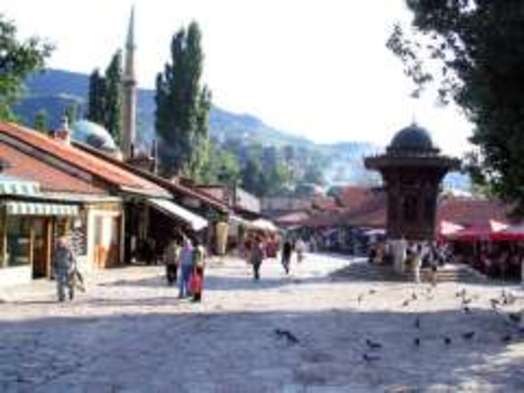
Adem Çoban
The Ramadan has a special importance in the Balkans. Especially here in Sarajevo, the capital of Bosnia Herzegovina, Ramadan has become an exceptional tradition. Congregations who come to listen to the chanting of the Quran before the morning twilight fill the Begova Mosque. Ten hafizes (hafiz; one who has memorized the Quran) including Prof. Dr. Faris Gavrankapetanoviç; chef of staff in the Faculty of Medicine Hospital, are reading the verses from the Quran in turns. Just before sunset people crowd into Bascarsija Market to break fasts and they can hardly find free seats in already full restaurants. Mosques are overflowing with people who come to perform taraweeh prayers. Vice President of Religious Affairs of Bosnia Herzegovina Ismet Spahic says Ramadan is the greatest factor that holds them tight to their beliefs.
The Ramadan is enjoyed with a different beauty of its own in every other part of the world. But in Bosnia it is relished in a more different spiritual pleasure. Luminous balconies of minarets sparklingly illuminating Sarajevo and vividly decorated shop windows are proofs of a Ramadan well enjoyed. Especially in Sarajevo, the capital of Bosnia Herzegovina, an exceptional tradition peculiar to Ramadan has been created. With the cannon fire from an emplacement overlooking the city everybody waiting in restaurants for the sunset, no matter whether they know each other or not, say ‘May Allah accept it’ to each other and break their fasts among the murmur of prayers. Then they go and eat sweet desserts in sweetshops and have a chat while drinking coffee or tea before they set off for mosques to perform taraweeh prayers.
Ramadan has a different atmosphere peculiar to itself in Bosnia says Ismet Spahic the Vice President of Religious Affairs of Bosnia Herzegovina. “Even during the communist era when all kinds of worshiping were prohibited we enjoyed Ramadan really well. Ramadan was the greatest factor in preservation of our religion despite all the difficulties forced by the communism”. Fasting in Ramadan protected Bosnians from assimilation just as it keeps one away from sins emphasizes Spahic. He further tells “If we still can stand as a nation today it is thanks to the fasting and chanting of the Quran in Ramadan months”. We learn from him that the chanting of the Quran by hafizes after dawn in Begova Mosque, which is the central mosque in Sarajevo, is a tradition preserved for centuries now. “The chanting of the Quran tradition has never ceased to be carried on even during the intensive skirmishes of the war in 1990 as well as during the communist era. Several bombs would hit the mosque’s courtyard in a night and chanting of the verses would go on and congregation would still listen to it inside the mosque ignoring the death behind the doors. Those readings of the Quran strengthened our spirits and raised the morale of the army. Even during the most violent days of the war hafizes kept reading the Quran and people prayed. One day when we got out of the mosque four cannon balls hit the courtyard in the same time and killed around 30 pigeons but none of us or hafizes got hurt. We took that incident to be a miracle bestowed upon us because of the chanting of the Quran” told Spahic
The livelihood in Sarajevo streets goes on all through the night. After performing taraweeh prayers people go to cafes and teahouses and chat till it is time to go to the pastry shops and eat something for the next day before the dawn. With the dawn they head towards the Begova Mosque with the Quran in their hands. There are also women as many as men joining the congregation. They follow to the Koran read by the hafizes in separate places reserved for them. There are ten hafizes, including a medicine professor, who read the Quran excellently. Each reads two pages in turns and they read a ‘fascicle’ (cüz: a thirtieth part of the Koran separately bound) a day. At the end they pray and ask for favors together and then after performing the Morning Prayer in congregation they set off for their houses.